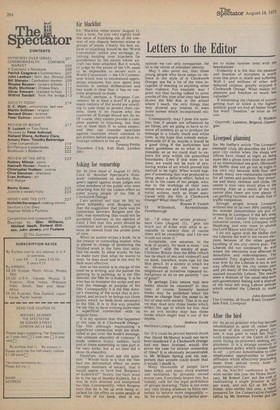Asking for censorship
Sir: In your issue of August II 1972, Cato in 'Another Spectator's Notebook' commented on Anthony Burgess's appeal against those judges and other members of the public who were attacking him for the violent effect on some young people of the film A Clockwork Orange.
Cato pointed out that he felt no great syntpathy with Burgess, and that the suggestion that there was no connection between Burgess and the tilm, was something that could not be accepted. Contrary to the opinion of Cato, I feel that this point should be considered and accepted, although it :must be viewed from the artists point of view.
When an author writes a book, he is the creator or controlling master, who is placed in charge of producing the finished work in the form that satisfied his needs. In other words, he has to make sure that what he wants to state, he does state and in the way he feels most effective.
Just as the author is in charge of the book he is writing, and the painter the painting he is painting; so is the film director, the film he is making. It is he who has to interpret the script and put over the message or purpose of the film, Consequently it is the film director's meaning of the script that is produced, and as such he brings out those points which he feels most necessary to the film. It is in this way possible for the film to have nothing more than a superficial connection with its original form.
It is my opinion that this happened in the case of A Clockwork Orange. The film although maintaining a superficial connection with the book, failed to put over the book's message, 'the ultimate absurdity of violence.' It made violence funny, sadistic, lurid and at times something to take part in for easy kicks; but at no time did it show its absurdity.
Therefore, we must ask the question: " Whose fault is it that the film had the detrimental effect on some younger members of society, that it would appear to have had Burgess's or Kubrick's? " Surely, the fault must lie in the lap of Stanley Kubrick, for it was he who directed and interpreted the film. Consequently, when Burgess says that he is fed up with being attacked for the effect on some people of the film of his book, then in my opinion we can only sympathise, for he is the victim of mistaken identity.
May I also point out, that those young people who have taken to violence in the style of A Clockwork Orange, are for a lot a the time incapable of reacting to anything other than violence. For example, may I point out that having talked to some youths of this type after they had been shown the film JCes in the school where I teach, the only things that they showed any interest in were those scenes which incorporated violence.
Consequently, may I pose the question that if people are influenced by art forms; are we going to have to remove all subtlety so as to produce the message in a totally black and white form, in the hope that nobody misunderstands it? If so, maybe it would be a good thing if the authorities laid down guidelines as to what is permissable, so as we could start to explore the area within the prescribed boundaries. Even if this were to he done, we could not be sure of producing works of art which proved this method to he right. What would happen if something that was produced to bring about a definite effect, 'failed to do so in the cases of ten people, who, due to the workings of their own minds went out and took part in antisocial actions, such as those associated with the film A Clockwork Orange? What then? No art?
Rowan P. Yorath
33 Willonhott, Ravensthorpe. Peterborough
































 Previous page
Previous page